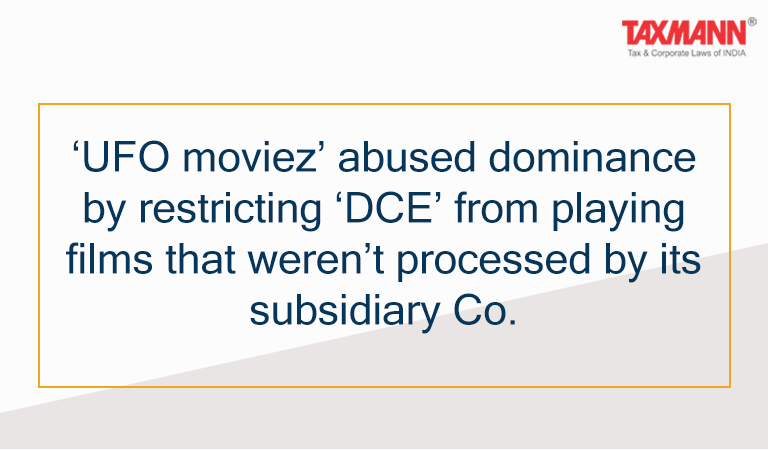‘UFO moviez’ abused dominance by restricting ‘DCE’ from playing films that weren’t processed by its subsidiary Co.
- Blog|News|Competition Law|
- 2 Min Read
- By Taxmann
- |
- Last Updated on 27 November, 2021

Case Details: CPF Digital Media Services Ltd. v. UFO Moviez India Ltd. - [2021] 132 taxmann.com 178 (CCI)
Judiciary and Counsel Details
-
- Ashok Kumar Gupta, Chairperson
- Ms. Sangeeta Verma and Bhagwant Singh Bishnoi, Member
- Ms. Nancy Roy, Ms. Niyati Kohli, Ms. Megha Bengani, Shashank Trivedi, Advocates, Niraj Sanghai, Authorised Representative, Arun Kathpalia, Senior Advocate, Ms. Bani Brar, Karan Singh Chandhiok, Avinash Amarnath, Upender Thakur, Advocates, Rajesh Mishra, Party-in-person, Zameer Nathani, Party-in-person, Tejveer Bhatia, Rahul Rai, Ms. Prachi Agarwal, Salman Qureshi, Advocates, Sanjay Jain, Party-in-person, Bharat Budholia, Ms. Aishwarya Gopalakrishnan, Advocates and Ms. Mahalakshmi. S., Party-in-person for the Appearing Parties.
Facts of the Case
In the instant case, the Informant was engaged in the business of post-production processing of cinematograph films. Opposite Party (UFO Moviez) was a company involved in the supply of Digital Cinema Equipment (DCE) to Cinema Theatre Owners (CTOs).
The opposite party (OP) was having a market share of 30 to 40 percent in the market for the supply of Digital Cinema Equipment (DCE), which was required to play digitally distributed cinematograph film by Cinema Theatre Owners (CTOs).
The informant had alleged that OP had agreed with CTOs, to supply DCE on lease to CTOs. As per said agreement leased to CTOs have been disabled from accepting content from any source other than ‘Scrabble’ subsidiary of OP.
The informants also alleged that the impugned agreement directs CTOs to refuse to deal with any producer of a cinematograph film who had not got his cinematograph film post-production processed by ‘Scrabble’.
According to the informant, this refusal to deal had been occasioned through a technical barrier inbuilt by OP into the DCE. This technological addition to DCE was involuntary on behalf of CTOs because OP had created this by deviating the said DCE from international standards and thus had contravened the provisions of section 3(4)(d) i.e refusal to deal.
The informants, also submitted that through agreement, OP was causing an appreciable adverse effect on competition in India as it had foreclosed existing competitors like informants and had created barriers against new entrants in the market for post-production processing.
CCI Held
Based on the above, the CCI observed that the imposition of said restraints amounts to a contravention of section 3 and section 4 of the competition act, which is prima facie found to enjoy market power in the market.
Accordingly, CCI directed the Director-General (DG) to cause an investigation to be made into the matter under the provisions of section 26(1) and to complete the investigation and submit the investigation report within 60 days.
List of Cases Referred to
-
- UFO Moviez India Ltd. v. Union of India [Company Appeal (AT) No. 48 of 2019, dated 24-10-2019] (para 6)
- Ravi Walia v. UFO Moviez India Ltd. [CS (Comm) 233 of 2019, dated 1-10-2019] (para 8)
Disclaimer: The content/information published on the website is only for general information of the user and shall not be construed as legal advice. While the Taxmann has exercised reasonable efforts to ensure the veracity of information/content published, Taxmann shall be under no liability in any manner whatsoever for incorrect information, if any.

Taxmann Publications has a dedicated in-house Research & Editorial Team. This team consists of a team of Chartered Accountants, Company Secretaries, and Lawyers. This team works under the guidance and supervision of editor-in-chief Mr Rakesh Bhargava.
The Research and Editorial Team is responsible for developing reliable and accurate content for the readers. The team follows the six-sigma approach to achieve the benchmark of zero error in its publications and research platforms. The team ensures that the following publication guidelines are thoroughly followed while developing the content:
- The statutory material is obtained only from the authorized and reliable sources
- All the latest developments in the judicial and legislative fields are covered
- Prepare the analytical write-ups on current, controversial, and important issues to help the readers to understand the concept and its implications
- Every content published by Taxmann is complete, accurate and lucid
- All evidence-based statements are supported with proper reference to Section, Circular No., Notification No. or citations
- The golden rules of grammar, style and consistency are thoroughly followed
- Font and size that’s easy to read and remain consistent across all imprint and digital publications are applied



 CA | CS | CMA
CA | CS | CMA
